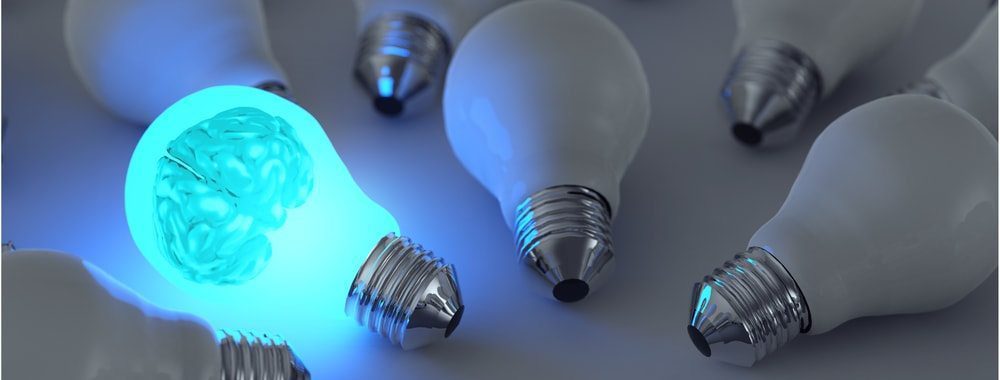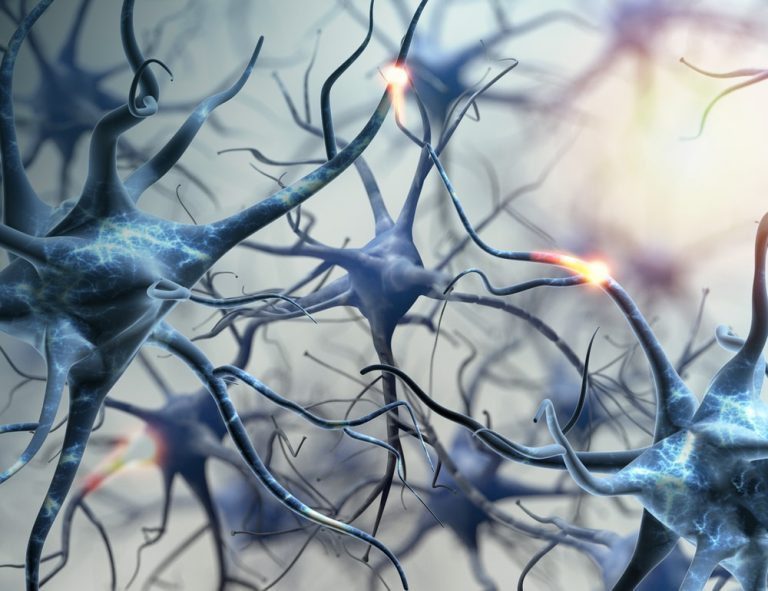0
You have 0 items in your cart

Does the brain grow continuously throughout our lives or does it stops growing once we reach a certain age? It is popular belief that our brains stop growing once we reach the age of 25. However, our brain is much more powerful than it seems.
 However, scientific research conducted has proven that the brain has the ability to form new neuro pathways and create neurons. This means that it is possible for the brain to continue increasing its plasticity depending on how we choose to take care of it. This is why people who read a lot of books and other publishing tend to have a better memory than those who read less frequently.
However, scientific research conducted has proven that the brain has the ability to form new neuro pathways and create neurons. This means that it is possible for the brain to continue increasing its plasticity depending on how we choose to take care of it. This is why people who read a lot of books and other publishing tend to have a better memory than those who read less frequently.
Conditions like dementia and others related to brain degeneration come to different people at different times. This can be attributed to how an individual engages their brain activity. Frequent engagement promotes plasticity while failure to engage your brain can result in its degeneration over time. That said, here are the top 7 ways to make your brain grow at any age:
Fasting has numerous benefits to the body; it is not just “something that religious people do.” In fact, scientists also recommend fasting every once in a while. The benefits of fasting include detoxification. When fasting, you are giving your body ample time to clean up any “excess baggage.” For example, if you are used to eating foods rich in salt on a regular basis, you are overwhelming your kidney and liver as they try to eliminate the excess salt. Regular eating will only add up to the weight of the already overloaded kidney. However, fasting gives room for the internal organs to take a break and detoxify.
 The best type of fasting is wet fasting, where you only drink water to keep you nourished. The water is used to cleanse your body from the inside out. This will eventually improve the functioning of your internal organs including the brain. Fasting also increases synaptic plasticity and promotes neuron growth. It also lowers the levels of leptin in the body thus encouraging the production of energy. Most detoxification routines encourage fasting as a way to encourage self-cleansing. Others have even used it for weight loss and management since it helps the body burn excess fat. This is because, during fasting, you’re the glucose levels in your body are very low, and as a result, excessive fat will be broken down to provide the energy required for sustenance.
The best type of fasting is wet fasting, where you only drink water to keep you nourished. The water is used to cleanse your body from the inside out. This will eventually improve the functioning of your internal organs including the brain. Fasting also increases synaptic plasticity and promotes neuron growth. It also lowers the levels of leptin in the body thus encouraging the production of energy. Most detoxification routines encourage fasting as a way to encourage self-cleansing. Others have even used it for weight loss and management since it helps the body burn excess fat. This is because, during fasting, you’re the glucose levels in your body are very low, and as a result, excessive fat will be broken down to provide the energy required for sustenance.
The 5:2 diet is always recommended as a form of fasting. This is a form of intermittent fasting where one eats a calorie-free diet for two days every week, then the rest of the week (5 days) they are expected to only consume maintenance calories. It was developed in the UK and there have been some claims that it has been successfully used for weight loss and management among other health benefits. It is recommended to keep fasting regularly so as to promote focus, clarity, and commitment.
The brain is like a muscle. When it is in use we feel very good. Understanding is joyous.

Traveling is good not only for your health but also for your brain too. This is because it exposes you to new ideas especially when you visit a new place. A good example would be taking an unplanned vacation to a whole new side of the world where you’ve never been to. For example, if you leave in Greenland, how about taking a trip to Hawaii? This will expose you to new cultures and ideas. You will also learn new things and how to adapt to different environments. On top of that, you will also have much fun. I mean, it’s always fun to socialize and interact with different people from different cultural backgrounds.
Touring the world promotes neurogenesis by exposing your brain to new environments and consequently, new challenges. They say that life begins at the end of your comfort zone, and what other way to get out of your comfort zone than to literally do it? According to Paul Nussbaum – who conducted a research on this – exposing your brain to new and challenging situations cause the brain to sprout dendrites. The best thing about this is that you don’t have to break the bank or make a big gesture for you to reap the benefits. Sometimes, a simple move such as taking a weekend road trip to the next city can still result in the same amount of stimulation.
These benefits of traveling are part of the reason why in some cases employees are encouraged to go for a retreat to a different place especially when working on a big project. This is because doing this will help them clear their minds and think more vividly. Feeling a little stressed with work? Try taking a vacation or a road trip to places you’ve never been to (thank me later). See that place in your bucket list where you’ve always wanted to go, maybe it’s time to do it and cross it off (I hope they have good food).
You have power over your mind, not outside events. Realize this, and you will find strength.
Dancing is fun, right? Guess what – it also makes you smarter! In fact, dancing has been associated with about 76% of risk reduction. It helps in improving your brain function and plasticity by forcing it to integrate multiple body functions. When you are on the dance floor having fun, the last thing on your mind is all your life troubles since you let yourself go and forget about your worries. This is good for your brain since it helps you eliminate stress which mainly interferes with your brain function. Dancing helps in integrating the kinesthetic, and rational functions of the brain. Moreover, it also contributes to the integration of the musical and emotional brain functions.
 When dancing, almost every part of your body is moving – depending on the rhythm of the song you are dancing to. Therefore, besides increasing brain plasticity, dancing also helps in improving body posture and balance. This is because, regardless of how you are dancing, whether you are moving too fast or too slow, your brain is provided with the challenge to ensure that you maintain your balance in order to minimize the risk of injury. Dancing can almost be equated to running since in both cases the whole body is moving. That said, it is a good form of exercise. In fact, in some gyms, they have incorporated dancing into their workout routines.
When dancing, almost every part of your body is moving – depending on the rhythm of the song you are dancing to. Therefore, besides increasing brain plasticity, dancing also helps in improving body posture and balance. This is because, regardless of how you are dancing, whether you are moving too fast or too slow, your brain is provided with the challenge to ensure that you maintain your balance in order to minimize the risk of injury. Dancing can almost be equated to running since in both cases the whole body is moving. That said, it is a good form of exercise. In fact, in some gyms, they have incorporated dancing into their workout routines.
Dancing also includes learning; where you learn a few dance moves or even a whole new dance routine. Learning promotes creativity by exposing your brain to new ideas. Also, when working with a choreographer, you are able to follow their lead, and as a result, you are teaching your brain to follow instructions while still increasing your cognitive stimulation. All these benefits of dancing are good for the brain. Therefore, it is advisable to consider dancing as a fun way to promote your brain plasticity.
It is true when they say that you are what you eat. This is because what you eat affects you in a big way. For example, eating foods rich in sugar is known to affect your mood and make you gloomy for the rest of the day. Consequently, eating a well-balanced diet can make you feel energetic and happy throughout the day. Therefore, always be careful of your food consumption. It is also true that what you eat affects how you think. Research conducted by scientist and other professionals such as Fernando Gomez-Pinilla who is a professor of neurosurgery at UCLAs David Geffen School of Medicine has shown can be used to back up this statement.
 His research proved that eating a high-fructose diet over the long term may alter the ability of your brain to learn and remember information. In other words, it means that frequently eating sugar-rich foods can affect your memory in the long-term. This is why most doctors and scientists always put an emphasis on checking the contents of your diet. Just like you take care of your body every day, it is important to take care of your brain, feed it with the right foods. Foods rich in nutrients are the best for your brain to keep it healthy and promote its function.
His research proved that eating a high-fructose diet over the long term may alter the ability of your brain to learn and remember information. In other words, it means that frequently eating sugar-rich foods can affect your memory in the long-term. This is why most doctors and scientists always put an emphasis on checking the contents of your diet. Just like you take care of your body every day, it is important to take care of your brain, feed it with the right foods. Foods rich in nutrients are the best for your brain to keep it healthy and promote its function.
That said, it is important to keep off or highly minimize the consumption of junk food or other foods that have no nutritional value. Large amounts of sweets in the brain can impair the synaptic activity of the brain and this disrupts the ability of the brain to think clearly. Also, stay away from foods that have empty calories such as alcohol. In fact, excessive consumption of alcohol is highly discouraged since it is known to impair your judgment. It also interferes with the part of your brain responsible for maintaining posture and balance. Therefore, it is important to eat healthy so as to promote brain plasticity.

On one hand, it is true that unity is strength and that there is power in working together. However, on the other hand, there is some power in solitude. If you have a big project coming up in the next few days and you are feeling overwhelmed about it, maybe it is time to take spend some time alone and reflect on it. Working in a group is not a bad idea, but it is advisable to always give yourself a head start before going for the group discussions or brainstorming sessions. Doing this will give your brain enough time to process the information and this will help you contribute your ideas during the group sessions.
Have you ever been in a group where people are talking about a topic or incident which you have no clue about? How does it feel? It is common to feel isolated and so out of place. However, if you had done some personal research on the topic, you could have been in a better position to speak out your thoughts. This also applies to this case. Sometimes, when working with a group, your ideas can get swallowed up by other people’s ideas. Consequently, you might feel intimidated by some of your colleagues prompting you to keep your ideas to yourself.
Being in solitude gives you no limits and therefore you are free to explore all avenues available to you without having to worry about other people’s opinions. Moreover, sometimes working in groups can waste a lot of time. Working alone helps you build your interwoven psychological traits like self-confidence, intelligence, and openness. Therefore, before calling up your colleagues for brainstorming, make sure that you have thought it through by yourself first. Being in solitude helps you build a strong personality and character and thus encourages brain plasticity.
Physical exercise comes with a myriad of benefits to your body. This is because it encourages the use of more than one body part at the same time thus promoting synchronization. Working out regularly does not only keep you fit but it also exercises your brain. This is why both men and women are encouraged to take a walk for at least 40 minutes three times a week. It is also advisable to do intensive workouts regularly. This will promote blood circulation both throughout the body and to the brain too. This will also result to the nourishment of the brain by transporting them via the blood.
 Regular exercise is also known to improve the connectivity between cells in the brain and the nervous system. It helps you improve your focus since regular exercise requires commitment and focus on the set goals. Committing yourself to following a particular exercise routine every week will teach your brain to be aware of patterns. This will, in turn, tune your biological clock to expect a particular thing at a given time. For example, if you make it a routine to do vigorous exercise or go for a run every day at 7 am, your brain will notice it after some time and every day at 7 in the morning, your body will be expecting you to exercise and burn some calories.
Regular exercise is also known to improve the connectivity between cells in the brain and the nervous system. It helps you improve your focus since regular exercise requires commitment and focus on the set goals. Committing yourself to following a particular exercise routine every week will teach your brain to be aware of patterns. This will, in turn, tune your biological clock to expect a particular thing at a given time. For example, if you make it a routine to do vigorous exercise or go for a run every day at 7 am, your brain will notice it after some time and every day at 7 in the morning, your body will be expecting you to exercise and burn some calories.
Another different case would be if you keep eating some type of food at a particular time every day, your brain will notice it and when that time comes, you will start craving that food. Therefore, it is important to keep yourself active throughout the day so as to promote better body functioning and brain plasticity. The first few days it might be difficult to start exercising but with time it will get easier. This is why it is recommended that you start slowly to give your body some time to adjust, then build up with time so as to minimize the risk of injury and avoid getting discouraged easily.
It goes without saying that the best way to develop your brain is to actually use it. History has shown that if a body part is out of use for a long time, it will start slowly degenerating. The brain is no exception in this case. Research conducted has proven that elderly people who are always active are less likely to suffer from dementia and memory loss. Also, most homes of the elderly like to encourage them to read more so as to promote brain activity. Reading takes you to places in the world where you have never been to physically. For example reading about a particular country will expose you to their history, cultural practices, seasons and other important events that they uphold.
 It is advisable that you develop a culture of always learning something new on a regular basis. Learn as much as you can and this will help you promote brain plasticity. Learn practical skills has been found to engage your brain more than just reading theoretically. Get yourself out there and learn how to play an instrument; enroll in a cooking or baking class. Enroll in an art class and learn how to look at things from an artistic point of view. Get yourself moving; just do anything besides just sitting down and watching as life passes you by.
It is advisable that you develop a culture of always learning something new on a regular basis. Learn as much as you can and this will help you promote brain plasticity. Learn practical skills has been found to engage your brain more than just reading theoretically. Get yourself out there and learn how to play an instrument; enroll in a cooking or baking class. Enroll in an art class and learn how to look at things from an artistic point of view. Get yourself moving; just do anything besides just sitting down and watching as life passes you by.
Learning an instrument has been proven to result into heightened connectivity between brain regions. Doing artwork involves your brain in a unique way since it enhances connectivity of your brain at a resting state. This is known as the dealt mode network. It is also good for strengthening the neural pathway that is responsible for controlling attention and focus. Therefore, seize every chance available to learn new skills. This will not only increase your general knowledge base but also promote brain plasticity.
Moreover, it is always advisable to have enough sleep regularly (at least 6 hours of continuous sleep every day). This will give your body ample time to rest and promote your focus. It also promotes brain health and boosts your energy reserves. In fact, lack of enough sleep has been highly associated with memory loss, dementia and other conditions related to brain degeneration.
Learning new skills is also a great way to keep your developing an open mind and learning to embrace change. Engaging your brain is not only important, but it can also be a lot of fun, as well as inexpensive. All you have to do is travel more often to new places and expose yourself to new experiences. Commit yourself to regular exercise and fasting every once in a while. Grow your brain to promote healing and improve your health generally. This will also enhance your memory and boost your energy levels. This increases your ability to manage your mind and emotions.
Your mind is a garden, your thoughts are the seeds. You can grow flowers, or you can grow weeds.
This Privacy Policy describes how SmartMinds Enterprise OÜ (“SmartMinds”, “we”, “us” or “our”) handles information about yourself that you may provide us with through your use of the Site or Service (“Personal Information”) and should be read along with our Terms of Use posted here, and all other operating rules and additional terms and conditions published on our Site.
SmartMinds is committed to keeping your information secure and managing it in accordance with our legal responsibilities under privacy and data protection laws where we operate. SmartMinds uses your Personal Information only in accordance with this Privacy Policy and Applicable Law. SmartMinds does not sell your Personal Information to third parties. Any capitalized terms not defined in this Privacy Policy are defined in the Terms of Use.
We employ the use of cookies. By using SmartMinds‘s website you consent to the use of cookies in accordance with SmartMinds’s privacy policy.
Most of the modern day interactive web sites use cookies to enable us to retrieve user details for each visit. Cookies are used in some areas of our site to enable the functionality of this area and ease of use for those people visiting. Some of our affiliate / advertising partners may also use cookies.
Unless otherwise stated, SmartMinds and/or it’s licensors own the intellectual property rights for all material on SmartMinds All intellectual property rights are reserved. You may view and/or print pages from https://smartminds.one for your own personal use subject to restrictions set in these terms and conditions.
You must not:
We will approve link requests from these organisations if we determine that: (a) the link would not reflect unfavourably on us or our accredited businesses (for example, trade associations or other organisations representing inherently suspect types of business, such as work-at-home opportunities, shall not be allowed to link); (b)the organisation does not have an unsatisfactory record with us; (c) the benefit to us from the visibility associated with the hyperlink outweighs the absence of SmartMinds; and (d) where the link is in the context of general resource information or is otherwise consistent with editorial content in a newsletter or similar product furthering the mission of the organisation.
These organisations may link to our home page, to publications or to other Web site information so long as the link: (a) is not in any way misleading; (b) does not falsely imply sponsorship, endorsement or approval of the linking party and its products or services; and (c) fits within the context of the linking party’s site.
If you are among the organizations listed in paragraph 2 above and are interested in linking to our website, you must notify us by sending an e-mail to Please include your name, your organisation name, contact information (such as a phone number and/or e-mail address) as well as the URL of your site, a list of any URLs from which you intend to link to our Web site, and a list of the URL(s) on our site to which you would like to link. Allow 2-3 weeks for a response.
Approved organizations may hyperlink to our Web site as follows:
No use of (name)’s logo or other artwork will be allowed for linking absent a trademark license agreement.
Without prior approval and express written permission, you may not create frames around our Web pages or use other techniques that alter in any way the visual presentation or appearance of our Web site.
We shall have no responsibility or liability for any content appearing on your Web site. You agree to indemnify and defend us against all claims arising out of or based upon your Website. No link(s) may appear on any page on your Web site or within any context containing content or materials that may be interpreted as libelous, obscene or criminal, or which infringes, otherwise violates, or advocates the infringement or other violation of, any third party rights.
We reserve the right at any time and in its sole discretion to request that you remove all links or any particular link to our Web site. You agree to immediately remove all links to our Web site upon such request. We also reserve the right to amend these terms and conditions and its linking policy at any time. By continuing to link to our Web site, you agree to be bound to and abide by these linking terms and conditions.
If you find any link on our Web site or any linked web site objectionable for any reason, you may contact us about this. We will consider requests to remove links but will have no obligation to do so or to respond directly to you.
Whilst we endeavour to ensure that the information on this website is correct, we do not warrant its completeness or accuracy; nor do we commit to ensuring that the website remains available or that the material on the website is kept up to date.
We have a 30-day Money Back Guarantee when purchasing Realized Mind, all we ask if that within the 30 days to complete the learning experience and if you truly feel you did not receive any value from the experience we are happy to refund your payment and close your account.
To the maximum extent permitted by applicable law, we exclude all representations, warranties and conditions relating to our website and the use of this website (including, without limitation, any warranties implied by law in respect of satisfactory quality, fitness for purpose and/or the use of reasonable care and skill). Nothing in this disclaimer will:
The limitations and exclusions of liability set out in this Section and elsewhere in this disclaimer: (a) are subject to the preceding paragraph; and (b) govern all liabilities arising under the disclaimer or in relation to the subject matter of this disclaimer, including liabilities arising in contract, in tort (including negligence) and for breach of statutory duty.
To the extent that the website and the information and services on the website are provided free of charge, we will not be liable for any loss or damage of any nature.
